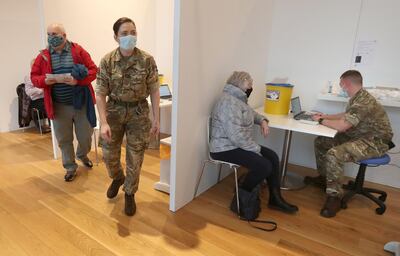Vaccination against Covid-19 significantly reduces the risk of serious illness, the first studies on the “real world” effects of the UK’s inoculation drive found.
Researchers found the risk of being admitted to hospital with Covid-19 drops substantially within weeks of the first dose of a vaccine.
The results of separate studies carried out by Public Health Scotland and Public Health England were released on the same day UK Prime Minister Boris Johnson announced the roadmap out of lockdown.
The Scotland study showed that four weeks after a first dose, the Pfizer-BioNTech and AstraZeneca-Oxford University vaccines reduced the risk of hospital admission by up to 85 per cent and 94 per cent, respectively.
Among those aged 80 years and over, one of the highest risk groups for Covid-19, vaccination was associated with an average 81 per cent reduction in hospital admissions.
The data was gathered between December 8 and February 15.
In that period, 1.14 million people, or 21 per cent of Scotland’s 5.4 million population, received a vaccine.
Researchers compared how many vaccinated and unvaccinated people were admitted to hospital with Covid-19.
In England, the inoculation of medical workers showed the Pfizer shot reduced the risk of infection by more than 70 per cent with one dose, rising to 85 per cent after the second dose.
There has not been enough time to assess the effect of the Oxford vaccine, which was authorised at a later date than that from Pfizer, officials said.
Researchers said the vaccine was able to reduce transmission of the virus.
Health staff who were vaccinated were tested every two weeks whether or not they had symptoms.
One dose reduced the risk of catching the infection by 70 per cent, researchers said.
“We’re showing that not only are you reducing symptomatic infection, you are reducing the number of those with asymptomatic infection as well,” PHE strategic response director Dr Susan Hopkins said.
“Reducing infection is key to reducing transmission.”
The studies provide the first publicly available data on the effects of the UK’s vaccination campaign.
Prof Aziz Sheikh from the University of Edinburgh, the lead author of the Scotland study, said the findings were positive.
"These results are very encouraging and have given us great reasons to be optimistic for the future," Prof Sheikh said.
The results have not been peer-reviewed, but they could ease concerns over Britain's decision to delay second doses to provide quicker protection for more of the population.
That decision was supported by another University of Oxford-led study on Friday, which showed its vaccine was more effective when there is a 12-week window between two doses.
Prof Sheikh said he expected other countries to follow suit.
"I am very encouraged. We now have national evidence ... that vaccination provides protection against Covid-19 hospital admissions,” he said.
"Roll-out of the first vaccine dose now needs to be accelerated globally to help overcome this terrible disease."
Jim McMenamin, of Public Health Scotland, said the findings were particularly important "as we move from expectation to firm evidence of benefit from vaccines".
Prof Chris Whitty, chief medical officer for England, said the research offered "encouraging early data" on vaccination reducing hospital admission.












